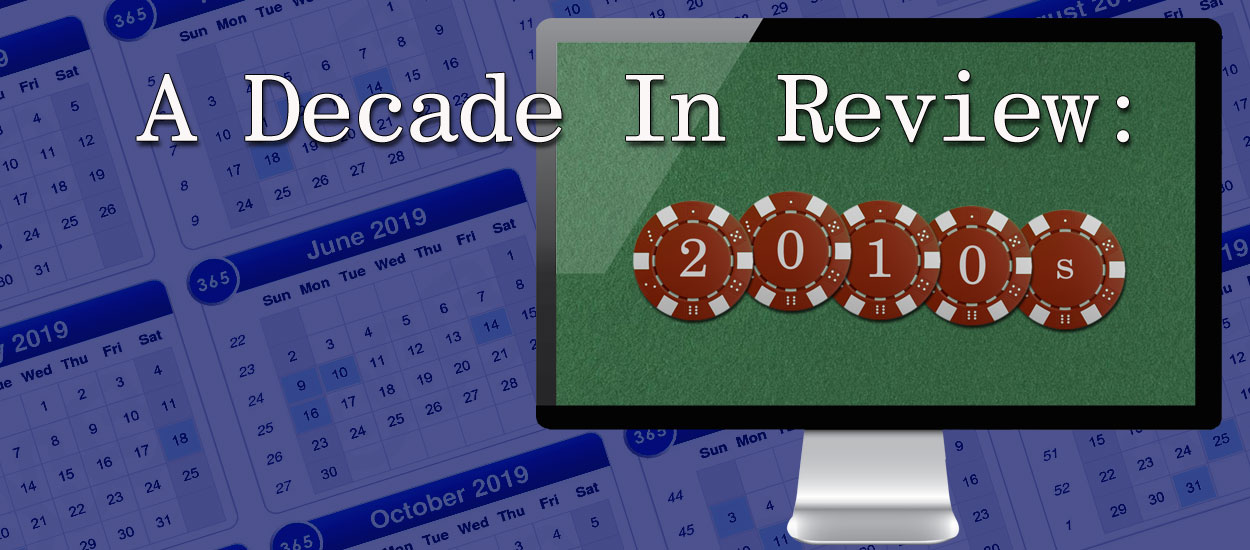Top 5 gambling stories of the 2010s
As we enter a new decade, it seems worthwhile to look at the previous decade and see what transpired that could affect the gambling industry moving forward. To understand why those developments were so important in the 2010s we need to look back 50 years to 1961 when the U.S. government enacted the Interstate Wire Act (known simply now as the Wire Act), which made it illegal for anyone to use telecommunication devices such as the telephone or telegraph to accept or place bets on sports. Until that time there was nothing on the books that explicitly made it illegal to accept telephone wagers (a common practice of the mob to help raise funds for other illicit activities). So, Robert F. Kennedy, the Attorney General at the time, wanted a federal law that unmistakably made that activity illegal and would provide the Department of Justice (DoJ) a reason to arrest any mobsters using the phone lines to accept sports bets that would stand up in court. That act has remained the most crucial legislation related to gambling in America and has been used many times by the DoJ to charge people who accepted wagers on sports. Unfortunately, the law has also been bastardized and used in areas it was never intended and consequently has stymied many new gambling initiatives.
Thus, the 1970s and 1980s were a fairly slow time for sports gambling in the U.S., but the 1990s were a different story. In 1992 the federal government passed the Professional and Amateur Sports Protection Act (PASPA), which made it illegal for states other than Nevada to take wagers on sporting events (although Delaware, Montana and Oregon were grandfathered in for smaller offerings like sports lotteries and parlay cards), and New Jersey had the option to opt into sports betting but chose not to, a decision that would haunt them years later. But, unquestionably, the biggest development for gambling in the 1990s occurred when the Internet became a viable communications method for wagering.
With the ease of placing and receiving bets on the Internet and cheapness of the new telecommunication option, sportsbooks and eventually poker and casino sites opened in droves in foreign jurisdictions like Antigua, Costa Rica and Kahnawake, Canada, who passed laws allowing operators there to take wagers from anywhere in the world. The majority of those gambling companies targeted the U.S. market, which led many in the U.S. government, headed by Janet Reno and John Kyl, to declare the Internet as being the same as the telephones and hence suggested online gambling was illegal under the 1961 Wire Act. The government also contended that even though the Wire Act mentioned sports betting only, the true interpretation of the law banned the use of the Internet for any forms of gambling and they said the law applied to bets placed from anywhere in the world if they targeted U.S. citizens.
That declaration was challenged by offshore governments and their clients and in the early 2000s Antigua took the U.S. to the WTO courts saying the U.S. was overstepping their boundaries and were in violation of trade agreements. The WTO ruled in favor of Antigua, but the U.S. Trade Representatives and the government ignored the WTO ruling and continued to insist that online gambling targeting Americans was illegal. To ensure their new ruling about online gambling couldn’t be challenged, many on Capitol Hill introduced bills to officially make online gambling illegal, but the bills kept getting defeated on technicalities. The DoJ instead chose a new method to get the word across and started issuing arrest warrants against foreign offshore operators, such as David Carruthers and various U.S. citizens who were living abroad. The DoJ, however, finally got their wish in 2006 when they passed the Unlawful Internet Gambling Enforcement Act (UIGEA) attaching it to the Safe Port Act to ensure passage. And in 2007 the DoJ and Treasury hastily wrote rules for the new law before the new Obama government took power. The rules, though poorly written, made it clear that banks were required to block all transactions for illegal gambling (which included all online gambling) and it was also clearly stipulated that any other laws such as the Wire Act that were on the books were still applicable. All public companies immediately stopped targeting U.S. citizens and many other companies that relied on U.S. action simply closed or sold operations to other non-public companies. The UIGEA also gave carveouts for fantasy sports, which eventually led to a new offering called Daily Fantasy Sports, which was a cleverly disguised form of gambling. DraftKings and FanDuel became the leaders of the new sports betting option.
That brings us to the 2010s where five developments occurred that will likely change the face of gambling in the United States forever.
5 – The changing fortunes of Atlantic City
When one thinks of casinos in the United States, Las Vegas and Atlantic City are the first two cities that come to mind. Atlantic City was always a place to go in the northeast for conventions, but it was only after the state passed a law allowing for gambling in the city in 1976 that Atlantic City became the place to go in the northeast to gamble. The boardwalk became known for gambling and fun. Interest in gambling at Atlantic City casinos started to decline in the 2000s and many attributed it to the location of the casinos. So, in the early 2000s the city in conjunction with Steve Wynn decided to create a new resort area near the marina with a new roadway connecting the boardwalk to the marina. This new area became known as the Marina district. Morgan Stanley also got on board and purchased land midtown, between the two areas, hoping they could develop that are into casino resorts. The plans never really took off. The lack of willingness by casino companies to take on the risk of a huge development combined with the recession not only led to companies deciding not to continue pursuing new casinos (MGM, Pinnacle and Mirage being the biggest three), it also led to the closures of numerous casinos starting the 2011. The first closure in the 2010s was the Trump Marina, which eventually was sold to the Golden Nugget, and four casinos were closed in 2014, including the Showboat, Atlantic Club, Trump Plaza and the Revel. And in 2016 the Trump Taj Mahal, dubbed a "world wonder" at the time of opening, closed shop. 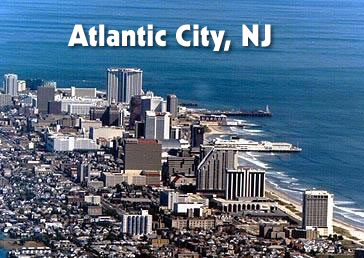 Things indeed looked bleak, but in 2013, a new online gambling law in New Jersey that required online operators to be located in Atlantic City or partnered with existing Atlantic City casinos provided new opportunities. Global companies like Betfair, who partnered with Golden Nugget, PokerStars who partnered with Resorts and 888 Gambling, who partnered with Caesars, provided new operating revenue and Las Vegas casinos partnered up too, as MGM partnered with Borgata. PokerStars almost saved Atlantic Club Casino after agreeing to buy the casino and even said they would keep all staff, but state legislators vetoed that purchase saying PokerStars were "bad actors". Online gambling started slowly but soon grew dramatically and it became evident that this new form of gambling could indeed be the savior of the city. While poker never took hold, online casino gambling at sites run by the likes of the Tropicana, the Golden Nugget and the Hilton took off and while that didn’t sell hotel rooms it still contributed to the bottom line of those companies. And after the repeal of PASPA a lot of people started to go to the casinos to watch and wager on sports. The repeal enabled sports betting operators like DraftKings to partner with Atlantic City casinos as well. Revenues which declined by half between 2012 and 2016 returned to 2012 levels in 2019 to almost $3.3 billion. The new interest in gambling also convinced companies to invest in Atlantic City. In 2018 the Hard Rock Casino took over the Taj Mahal property and the Oceans Casino took over the Revel property. Both casinos not only saw good gambling revenue, but also saw high occupancy rates at the hotel rooms.
Things indeed looked bleak, but in 2013, a new online gambling law in New Jersey that required online operators to be located in Atlantic City or partnered with existing Atlantic City casinos provided new opportunities. Global companies like Betfair, who partnered with Golden Nugget, PokerStars who partnered with Resorts and 888 Gambling, who partnered with Caesars, provided new operating revenue and Las Vegas casinos partnered up too, as MGM partnered with Borgata. PokerStars almost saved Atlantic Club Casino after agreeing to buy the casino and even said they would keep all staff, but state legislators vetoed that purchase saying PokerStars were "bad actors". Online gambling started slowly but soon grew dramatically and it became evident that this new form of gambling could indeed be the savior of the city. While poker never took hold, online casino gambling at sites run by the likes of the Tropicana, the Golden Nugget and the Hilton took off and while that didn’t sell hotel rooms it still contributed to the bottom line of those companies. And after the repeal of PASPA a lot of people started to go to the casinos to watch and wager on sports. The repeal enabled sports betting operators like DraftKings to partner with Atlantic City casinos as well. Revenues which declined by half between 2012 and 2016 returned to 2012 levels in 2019 to almost $3.3 billion. The new interest in gambling also convinced companies to invest in Atlantic City. In 2018 the Hard Rock Casino took over the Taj Mahal property and the Oceans Casino took over the Revel property. Both casinos not only saw good gambling revenue, but also saw high occupancy rates at the hotel rooms.
No doubt Atlantic City isn't out of the woods. Some casinos have seen revenue declines and with Pennsylvania gambling (particularly in Philadelphia) growing in leaps and bounds, it's inevitable many Pennsylvania residents will abandon Atlantic City casinos and stay home instead. And once New York City offers online sports betting one can only imagine how much that will affect Atlantic City revenue.
Nevertheless, in 2014 Governor Christie all but declared Atlantic City a lost cause as a viable gambling mecca, so the fact it rebounded so well is proof that nothing is ever over until it's over. The decline and rise of the once revered gambling mecca makes the Atlantic City changing fortunes the number 5 gambling development of the 2010s.
4 – Black Friday
In 2003 ESPN expanded its coverage of the World Series of Poker main event and most online poker sites offered low buy-in satellite tournaments with a ticket to the WSOP as the main prize. With the expanded coverage and the introduction of the hole card camera, which allowed viewers to see the cards of each player, thousands of ESPN customers watched as Chris Moneymaker, an Internet player, turned an $86 satellite ticket to a $2.5 million payout. Internet players soon learned you didn't have to be rich or a professional to become a WSOP champion and they used the TV telecasts to gain a new knowledge and interest in the product. Thus, a plethora of gamblers who were never interested in poker started playing the game and online poker skyrocketed. 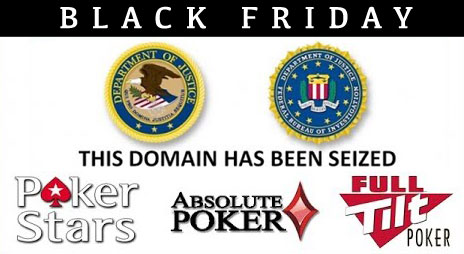 With the renewed interest in poker, several companies like PokerStars, Full Tilt and Party Poker started to grow rapidly. But, after the passing of the UIGEA, Party Poker withdrew from the U.S. market. So, by 2010 PokerStars and Full Tilt had over 90% of U.S. action. The two companies along with Cereus Poker, which operated from the Kahnawake reserve under the brands Absolute Poker and Ultimate Bet, indicated that they didn't believe the UIGEA applied to them since poker is a game of skill and is exempt. But the U.S. government disagreed and on Friday April 15, 2011, a date known as Black Friday, the FBI charged all three companies with bank fraud and money laundering and seized the dot com websites of PokerStars, Full Tilt, Absolute Poker and Ultimate Bet. PokerStars and Full Tilt blocked all U.S. accounts immediately and tried to cater to the rest of the world via a .eu domain which was out of the reach of the U.S. government and Cereus eventually just shut down operations.
With the renewed interest in poker, several companies like PokerStars, Full Tilt and Party Poker started to grow rapidly. But, after the passing of the UIGEA, Party Poker withdrew from the U.S. market. So, by 2010 PokerStars and Full Tilt had over 90% of U.S. action. The two companies along with Cereus Poker, which operated from the Kahnawake reserve under the brands Absolute Poker and Ultimate Bet, indicated that they didn't believe the UIGEA applied to them since poker is a game of skill and is exempt. But the U.S. government disagreed and on Friday April 15, 2011, a date known as Black Friday, the FBI charged all three companies with bank fraud and money laundering and seized the dot com websites of PokerStars, Full Tilt, Absolute Poker and Ultimate Bet. PokerStars and Full Tilt blocked all U.S. accounts immediately and tried to cater to the rest of the world via a .eu domain which was out of the reach of the U.S. government and Cereus eventually just shut down operations.
The U.S. government eventually reopened the .com sites temporarily so American customers could receive funds they had in those accounts and while PokerStars paid customers everything owed, Full Tilt and Cereus indicated they didn't have the money to pay players back. The FBI called Full Tilt a Ponzi scheme saying management made a fortune at the expense of customer deposits, although the truth is that Full Tilt invested the post up funds in new innovations, while PokerStars segregated the post up funds which allowed them to pay back players right away.
The government likely thought they would be hailed as heroes by the public for exposing Full Tilt, but most U.S. Full Tilt players blamed the government for the developments and demanded their money back. The government clearly were worried this anger would be reflected at the ballot box so the government cut a deal with PokerStars. Under the agreement the government would not pursue charges and would allow PokerStars to continue operating stateside in the future in exchange for PokerStars giving the DoJ enough money to pay back Full Tilt players, purchasing the assets of the now insolvent company for a fee and paying a fine to the U.S. government for continuing to operate after the passing of the UIGEA.
The effects of Black Friday were immediately evident. The vast majority of U.S. poker players with PokerStars and Full Tilt accounts simply dropped out rather than looking for alternate sites and viewership of poker on TV became practically non-existent resulting in the canceling of shows like Poker After Dark and the Big Game. Moreover, poker play at land-based casinos declined dramatically leading to most Las Vegas casinos closing or dramatically limiting their poker rooms for cash games and tournaments at land-based casinos all but disappeared. It appears without the ability to play online, the excitement surrounding poker was just not there at the casinos. WSOP entries have stayed high, although the field now is mostly made up of professionals who can afford the $10,000 buy-in, as well as a few non-U.S. Internet players who still won the limited satellites offshore. As well, the seizures of the websites on Black Friday as well as on Blue Monday the next week led to online gambling sites quickly looking for .eu and other non .com extensions that were out of reach by the U.S. government.
The huge decline in poker interest after the Black Friday seizures makes that the 4th biggest development of the last decade.
3 – The introduction of cryptocurrency One of the most devastating effects of the UIGEA to the offshore gambling industry was the difficulty the law made in making deposits for gambling. Because they couldn't be sure if deposits were for legal or illegal gambling most banks declined all payments for gambling making it virtually impossible for bettors to make credit card deposits. As well the law eventually led to payment processors like NETeller to withdraw their U.S. facing services and money transfer services like Western Union and MoneyGram stopped processing deposits as well. Offshore companies had to look for creative methods to get around the law such as disguising credit card deposits so they didn't appear to be for gambling; asking for money transfers to individuals at the books rather than the company itself; and requesting non U.S. citizens to deposit for American players. Withdrawal methods were even more limited. And withdrawals were almost always by checks from rogue processors often written on drafts from banks in countries like Cyprus or Iceland. Not surprisingly a lot of U.S. bettors gave up on their accounts since they didn’t think the risk was worth the reward and some companies like The Greek and Pinnacle Sports stopped taking U.S. action and focused on the rest of the world instead where payment options were more plentiful. Unfortunately, the lack of U.S. action eventually led The Greek to close.
One of the most devastating effects of the UIGEA to the offshore gambling industry was the difficulty the law made in making deposits for gambling. Because they couldn't be sure if deposits were for legal or illegal gambling most banks declined all payments for gambling making it virtually impossible for bettors to make credit card deposits. As well the law eventually led to payment processors like NETeller to withdraw their U.S. facing services and money transfer services like Western Union and MoneyGram stopped processing deposits as well. Offshore companies had to look for creative methods to get around the law such as disguising credit card deposits so they didn't appear to be for gambling; asking for money transfers to individuals at the books rather than the company itself; and requesting non U.S. citizens to deposit for American players. Withdrawal methods were even more limited. And withdrawals were almost always by checks from rogue processors often written on drafts from banks in countries like Cyprus or Iceland. Not surprisingly a lot of U.S. bettors gave up on their accounts since they didn’t think the risk was worth the reward and some companies like The Greek and Pinnacle Sports stopped taking U.S. action and focused on the rest of the world instead where payment options were more plentiful. Unfortunately, the lack of U.S. action eventually led The Greek to close.
Things looked bleak for offshore companies until around 2013 when some owners and managers took notice of something called bitcoin. Internet geeks espoused the benefit of bitcoins including the transparency of blockchain technology but for offshore books the only thing that mattered was that all transactions were anonymous, that bitcoins had value and they could be easily used for payments outside the reach of banks. When bitcoins were first transacted, they were primarily used for to buy contraband and for illegal activities like the hiring of hitmen. Consequently, many viewed bitcoins as taboo. But eventually the illegal sites like Silk Road were shut down and the cryptocurrency started rising in price. At first the only gambling sites taking the cryptocurrency were bitcoin specific companies like Satoshi Dice and BTCSportsbet, but eventually mainstream gambling companies accepted bitcoin as well.
The general philosophy of the mainstream operators was they had nothing to lose. More often than not the sites converted bitcoin deposits into U.S. dollars at the current exchange rate which bettors used to place bets and any withdrawals were sent back in bitcoins to the bettor at the current exchange rate. Fluctuations in bitcoin prices caused some frustration, but eventually the gambling companies learned how to deal with that and some companies like Heritage Sports even set up their own exchange. Now most U.S. facing offshore companies will only process transactions for their U.S. clients via cryptocurrency such as Bitcoin, Litecoin, Bitcoin Cash or Ethereum and a lot of the operators are on record saying that the anonymity of the coins, along with the fact they are untraceable, can't be reversed and are completely out of the control of banks makes them the ideal option for gambling and saved their businesses.
Without cryptocurrency it is almost certain the U.S. facing offshore gambling industry would be all but extinct. But cryptocurrency has not only saved the offshore industry, it has also provided many of those companies a bright future. For that reason, the introduction of bitcoin is the number 3 most important development of the last decade for the gambling industry.
2 – The repeal of PASPA by the Supreme Court
Until the 1990s it was accepted that the only legal way to bet on sports in the United States was in Nevada. Most bettors "knew someone" who would take their bet or had a friend who knew someone, but these underground bookmakers were clearly illegal and were precisely who the Wire Act was intending to stop. In the early 1990s, however things changed when companies located in the UK, Austria, Antigua, Costa Rica etc. started taking telephone wagers on sports from anywhere in the world, including the United States. They were able to do so after the countries they were operating from enacted legislation allowing the bets, provided the companies charged a tax on the wagers and submitted that tax revenue to the governments. Consequently, operations like World Wide Telesports, Post Time Sports, SBG Global and Bowman’s International opened shop and targeted U.S. citizens. They used radio and TV programs in the U.S. to advertise their phone betting operations as well. Unfortunately, along with the legitimate operations there were several scam operations like Top Turf and Dial-A-Bet. The Wire Act disallowed sports betting on the phone, but because these companies were located offshore the government didn’t take notice until later.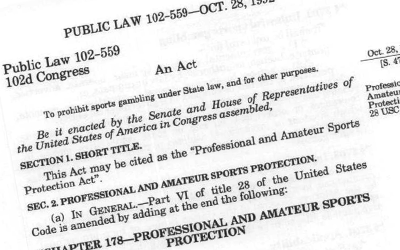 Things really opened up later in the 1990s when the Internet became a viable method for betting. Several countries created tax free zones and allowed for Internet betting in exchange for a licensing fee. The ease of wagering for bettors, the ability to wager without paying a tax on winning bets (which was common with offshore betting), the feasibility of accepting smaller limit wagers and the bonuses and unique offers provided by online sportsbooks made it a preferred method for American sports bettors, including those who wagered in Nevada. Moreover, a new payment provider called NETeller allowed Americans to deposit, withdraw and transfer money to other players anonymously which was crucial for bettors who didn’t want the IRS knowing about winnings. The sports betting offshore industry was quite rocky at times including when the DoJ arrested and jailed Jay Cohen from World Sports Exchange and after owners from companies like Aces Gold and Camelot ran off with players money when they got in over their heads. Nevertheless, the industry continued to flourish until 2006 when the UIGEA was passed. That law forced many sports betting operators to shut down and payment methods all but dried up.
Things really opened up later in the 1990s when the Internet became a viable method for betting. Several countries created tax free zones and allowed for Internet betting in exchange for a licensing fee. The ease of wagering for bettors, the ability to wager without paying a tax on winning bets (which was common with offshore betting), the feasibility of accepting smaller limit wagers and the bonuses and unique offers provided by online sportsbooks made it a preferred method for American sports bettors, including those who wagered in Nevada. Moreover, a new payment provider called NETeller allowed Americans to deposit, withdraw and transfer money to other players anonymously which was crucial for bettors who didn’t want the IRS knowing about winnings. The sports betting offshore industry was quite rocky at times including when the DoJ arrested and jailed Jay Cohen from World Sports Exchange and after owners from companies like Aces Gold and Camelot ran off with players money when they got in over their heads. Nevertheless, the industry continued to flourish until 2006 when the UIGEA was passed. That law forced many sports betting operators to shut down and payment methods all but dried up.
Back at home, in the 2010s the state of Delaware decided to use their carveout under PASPA to offer parlay wagering on NFL games and New Jersey passed a law to permit sports betting at their racetracks and casinos after citizens of New Jersey voted by a two-to-three margin in a 2012 referendum to allow it. But New Jersey was unable to offer sports betting despite the referendum because the leagues challenged the referendum in courts and a district court ruled that the state could not offer sports betting, since it was still illegal under federal law. New Jersey challenged that district court ruling at the Supreme Court (SCOTUS) as a last-ditch effort to get their sports betting law okayed. To the shock of almost everyone in the industry SCOTUS agreed to hear the case in 2017. More surprising, leagues started coming aboard promoting sports betting. NBA Commissioner Adam Silver indicated he was okay with sports betting and other leagues indicated they would not fight it if SCOTUS determined PASPA unconstitutional. In 2018 SCOTUS indeed ruled PASPA unconstitutional and repealed the law, with most Republicans on the bench voting to repeal it, while three of the Democrats on the bench voted to keep the law. Delaware and New Jersey were the first states to legalize sports betting and now almost half the states have legalized it and it is expected almost 40 states will have legal sports betting in the next few years.
The repeal of PASPA was significant for many reasons. First and foremost, it gave Americans an option to wager legally without having to travel to Nevada. Second it gave hope to struggling racetracks and land-based casinos who were desperate for something that would attract new gamblers. Third, it provided a new life to DraftKings and FanDuel who were in deep trouble due to declining interest in daily fantasy sports but were now able to offer a product with more upside potential. Fourth it indicated a new way of thinking by leagues regarding sports betting, which in turn opens new revenue opportunities for players and teams to help increase profits and salaries. And lastly, it provided a chance for offshore sportsbooks to take a breath since with legal state sponsored sports betting there is really no reason nor justification for the FBI to continue using resources to try and prosecute offshore operators.
For all those reasons and because it illustrates a whole new attitude towards gambling by the Supreme Court in the United States, the repeal of PASPA was the second most important development of the 2010 to 2019 decade.
1 – The 2011 DoJ opinion on the Wire Act
While the Wire Act has acted as a noose around the necks of the gambling industry for decades, the DoJ under the Obama Administration tried to end all confusion surrounding the law by making the following statement in December 2011:
"The Department’s Office of Legal Counsel (“OLC”) has analyzed the scope of the Wire Act, 18 U.S.c § 1084, and concluded that it is limited only to sports betting."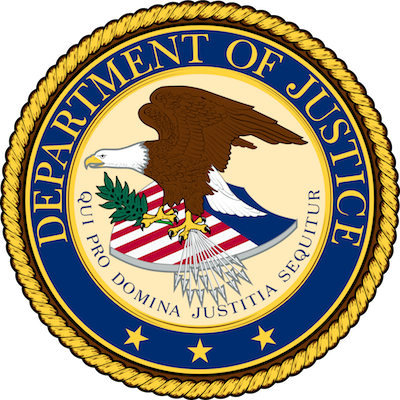 That statement written by U.S. Attorney General James Cole eliminated any confusion of whether the Wire Act was valid for all forms of gambling or just sports. Consequently, it paved the way for legal online casinos and poker sites to start operating in the United States. Ironically, Illinois which asked for the DoJ opinion clearly wanted all online gambling declared illegal once and for all under the Wire Act but were likely blindsided when they got a ruling they were not prepared for. In announcing their opinion, the DoJ cited a ruling made previously by courts in 2002 when George W. Bush was president, which said that in that court’s opinion the Wire Act only applies to sports betting. Consequently, the Democrat led DoJ were just affirming a Republican opinion thus making it a non-partisan decision.
That statement written by U.S. Attorney General James Cole eliminated any confusion of whether the Wire Act was valid for all forms of gambling or just sports. Consequently, it paved the way for legal online casinos and poker sites to start operating in the United States. Ironically, Illinois which asked for the DoJ opinion clearly wanted all online gambling declared illegal once and for all under the Wire Act but were likely blindsided when they got a ruling they were not prepared for. In announcing their opinion, the DoJ cited a ruling made previously by courts in 2002 when George W. Bush was president, which said that in that court’s opinion the Wire Act only applies to sports betting. Consequently, the Democrat led DoJ were just affirming a Republican opinion thus making it a non-partisan decision.
The effects of the 2011 ruling were almost immediate. The New Jersey legislature passed a bill earlier in 2011 to legalize online casinos and poker but Governor Chris Christie vetoed that bill, saying he believed it violated federal and state rules. Most agree, however, that the true motive for the veto was because Christie was planning to run for the Presidency in 2012 and was concerned that being associated with online gambling would hurt his chances with the Republican delegates. When Christie dropped out of the running for the 2012 presidency and the DoJ issued its opinion, he agreed to sign the bill into law, provided rules were added to ensure it was in line with state laws, including a requirement that all online gambling was conducted by Atlantic City casinos or by companies that partnered with casinos there. Since that time Delaware, Iowa, Pennsylvania, Michigan and Nevada have introduced online gambling as well and it is believed most states will follow suit in the next few years once they reach agreements with other casino companies, the racing industries and Tribal governments.
Unfortunately, the DoJ ruling was not met with fanfare from everyone. Sheldon Adelson, the CEO of Las Vegas Sands, launched a campaign to nullify the 2011 opinion and recruited friends on Capitol Hill to introduce a bill called RAWA (Restoration of America’s Wire Act), which aimed to make online gambling, including that which was already operating, illegal. By all accounts Adelson doesn’t believe he would be successful with online gambling and he wants to eliminate anything that would deter people from going to his land-based casinos. It appeared at the end of 2018 that Adelson might have succeeded in his mission when the DoJ under the Trump Administration secretly passed a ruling to reverse the 2011 opinion, but the New Hampshire Lottery took the DoJ to court and the New Hampshire court said that the new opinion was invalid. Nevertheless, the DoJ has not relented and it appears they will move forward in 2020 to get the opinion overturned, if feasible. Whether that happens will likely depend on whether the Supreme Court will hear the case, whether the Republicans are able to stay in power after the next election and whether Adelson’s health holds out. It is widely accepted that most Republicans don’t care about RAWA and are only pursuing the initiative to appease the Republican party’s largest campaign donor. If Adelson’s health deteriorates dramatically then it’s almost certain the Republicans would drop all future appeals and efforts to reverse the 2011 opinion.
Nevertheless, online gambling his here and it is thanks to the 2011 DoJ opinion. For that reason, the DoJ opinion is the biggest development of the 2010 to 2019 decade.
Will the 2020s be another decade with big gambling developments or will it be like the 1970s and 1980s where little happens? We can only wait and see, but with so many issues going on such as the attempt by some Republicans to change back the 2011 DoJ opinion, with legal online gambling and sports betting just in its infancy, and with governments and Tribes at loggerheads over gambling in several states, my money is on the 2020s being another significant decade for gambling developments.
Read insights from Hartley Henderson every week here at OSGA and check out Hartley's RUMOR MILL!










